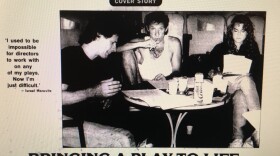
Shankar Vedantam
Shankar Vedantam is NPR's social science correspondent and the host of Hidden Brain. The focus of his reporting is on human behavior and the social sciences, and how research in those fields can get listeners to think about the news in unusual and interesting ways. Hidden Brain is among the most popular podcasts in the world, with over two million downloads per week. The Hidden Brain radio show is featured on some 250 public radio stations across the United States.
Before joining NPR in 2011, Vedantam spent 10 years as a reporter at The Washington Post. From 2007 to 2009, he also wrote the Department of Human Behaviorcolumn for the Post.
Vedantam and Hidden Brain have been recognized with the Edward R. Murrow Award, and honors from the American Association for the Advancement of Science, the Society for Personality and Social Psychology, the International Society of Political Psychology, the Society of Professional Journalists, the National Association of Black Journalists, the Austen Riggs Center, the American Psychoanalytic Association, the Webby Awards, the Pennsylvania Associated Press Managing Editors, the South Asian Journalists Association, the Asian American Journalists Association, the Pennsylvania Newspaper Association, the American Public Health Association, the Templeton-Cambridge Fellowship on Science and Religion and the Rosalynn Carter Mental Health Journalism Fellowship.
From 2009 to 2010, Vedantam served as a fellow at the Nieman Foundation for Journalism at Harvard University.
Vedantam is the author of the non-fiction book The Hidden Brain: How Our Unconscious Minds Elect Presidents, Control Markets, Wage Wars and Save Our Lives. The book, published in 2010, describes how unconscious biases influence people.
Outside of journalism, Vedantam has written fiction and plays. His short story-collection, The Ghosts of Kashmir, was published in 2005. The previous year, the Brick Playhouse in Philadelphia produced his full-length comedy, Tom, Dick and Harriet.
Vedantam has served as a part-time lecturer at Harvard University and Columbia University. He has also served as a senior scholar at the Woodrow Wilson International Center in Washington.
-
We don't always behave the way economic models say we will. We don't save enough for retirement. We give money to charity. This week, why we act in ways that go against our "rational" self-interest.
-
Far from being "the great equalizer," COVID-19 has disproportionately sickened and killed African Americans and Latinos in the U.S. Many of the reasons for these inequalities reach back to before the pandemic began. This week, we return to a 2019 episode that investigates a specific source of racial disparities in medicine and beyond—and considers an uncomfortable solution.
-
On this week's radio show, we trace the history of fake news. Plus, in a time when accurate information is so important, we ask who ultimately bears the cost when no one wants to pay for local news.
-
Amidst the confusion and chaos of the COVID-19 pandemic, many of us have sought out a long-trusted lifeline: the local newspaper. Though the value of local journalism is more apparent now than ever, newspapers are not thriving. They're collapsing. For many communities, this means fewer local stories and job losses. But new research suggests there's another consequence that's harder to spot — one that comes with a hefty price tag for residents. This week on Hidden Brain, we return to a 2018 episode that's acutely relevant today and ask, who bears the cost when nobody wants to pay?
-
Confined to our homes, many of us are experiencing a newfound appreciation for our social relationships. What we may not realize — and what physicians and researchers have only recently started emphasizing — is the importance of these connections to our physical health. This week, we talk with former U.S. Surgeon General Vivek Murthy about why he considers loneliness a matter of public health, and how we can all deepen our social ties.
-
A virus is more than a biological organism. It's a social organism. Historian Nancy Bristow shares the lessons about human behavior that we can take away from a century-old pandemic.
-
As a society, we talk about sex more openly today than ever before. But so much still goes unsaid. This week on the Hidden Brain radio show, complicated stories of intimacy and attraction.
-
How many ads have you encountered today? On this week's radio show, we discuss the insidiousness of advertising in American media.
-
This week on the Hidden Brain radio show, we dig into the culture and psychology that determines the foods that make us salivate and the scents that make us squirm.
-
Decades ago, a group of women accused a prominent playwright of sexual misconduct. For the most part, the complaints went nowhere. In 2017, more women came forward. This time, people listened.









